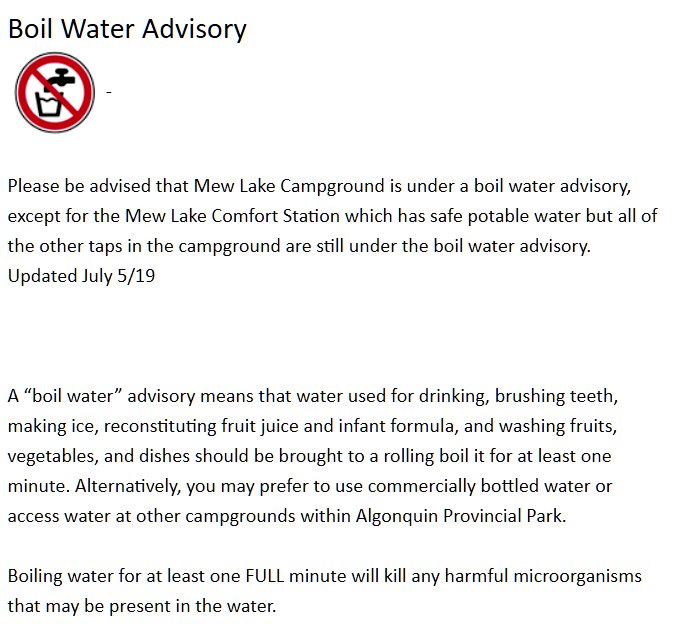



![]() Offline
Offline
(Link added by edit)
This is not good. It applies to Canisbay, Lake of Two Rivers, Mew Lake, Pog and Two Rivers.
Last edited by BarryB (7/04/2019 12:11 pm)
![]() Offline
Offline
Is there anything generally known about what is going on with this? This sounds different than the algae situation further east in the park, but to me a little stranger, because I would think this warning is about well water, and it seems odd to me that there would be a microbial problem with that. (although I'm as far from expert on that subject as you can get). Also, does that mean a water filter wouldn't be sufficient at these locations, that you'd actually have to boil the water?
![]() Offline
Offline

I counted three "advisories" in the link that mentioned "forms of algae" without going into detail; it said that at Mew Lake they were bringing in "potable water". Personally I have never seen anything like this before although I'm somewhat aware of the issue of giardia which IIRC is a multi-cellular organism.
One related thread here is a bit heavy on the tech (as in hardware solutions) jargon -
![]() Offline
Offline

Most of the campgrounds use concrete holding tanks which are filled by tank-truck with water drawn from local remote lakes. If a remote water source lake develops a problem, then anywhere that water is used is affected.
![]() Offline
Offline
Really?! Wow I had no idea that that’s the system used, I would have just assumed well water. That lake water must be treated though, or at least filtered? I can’t imagine the park would deliver straight lake water, no matter from how remote...?
Anyway, pretty safe to assume this isn’t a blue-green algae issue, since that contamination can actually be rendered more dangerous with boiling.
![]() Offline
Offline

Guess I should qualify my comment. Back around 2000, I was camping at Rock Lake and had occasion to hike by backroad to Speckledtrpout Lake (to the northwest). There I came across a big tank truck filling-up by pump and hose. I chatted with the driver and he said the water was going to the Rock Lake campground holding tank. Then around 2008 I was talking with park management and was told that this method of water supply was being used. Conceiveably over the years that method of water supply could have changed. However, given the boil water advisories, I'm thinking that method is likely to still be used.
![]() Offline
Offline
MooseWhizzer Dave wrote:
Is there anything generally known about what is going on with this? This sounds different than the algae situation further east in the park, but to me a little stranger, because I would think this warning is about well water, and it seems odd to me that there would be a microbial problem with that. (although I'm as far from expert on that subject as you can get). Also, does that mean a water filter wouldn't be sufficient at these locations, that you'd actually have to boil the water?
I read on the Algonquinpark.on.ca page that using filters wouldn't work and you should boil your water. Read the boil water advisories for full details.
![]() Offline
Offline

That's amazing. I guess I have... gradually become aware... through CDC and other sources... of rising rates of giardia starting around... 1982 say (guesstimate).
I guess the last time I drank water directly out of a lake was at either Manitou Lake or Three Mile Lake (near Kiosk) around the summer of... 1978 or thereabouts. Ran out of bottled water and food on that trip & was reduced to mussels, rushes and other wild edibles. Not being a fisherman it was most annoying to watch other people pulling huge lake trout, easy as pie. Fortunately it was August and there were berries!
While hiking alone I drank out of a ground spring once in the mid-1970s.
![]() Offline
Offline

A few weeks ago this fishing guide chap was on local cable TV. It was hard to find this clip btw; it doesn't appear on their web page if you search with a word like "Algonquin". I first noticed the clip when I saw the guy rowing a canoe which surprised me. Anyway he says the lakes are getting warmer and I am left wondering if this is related to algae in some way.
Added keywords: Global TV rowboat
Last edited by Roman_K2 (11/04/2019 7:51 pm)
![]() Offline
Offline

It can't be blue-green algae (what's affecting Dickson, Ryan etc.) because boiling water containing blue-green algae actually makes it more dangerous to drink. Boiling bursts the algae cells which releases the toxins. Most anything else encountered in Algonquin can be boiled out, including giardia. I'm not sure what you'd encounter in Algonquin that can be boiled out but not filtered out, unless they have a concern about a virus being in their water supply which would be unlikely. Maybe they just don't want to have to get into the subtleties of the various filter/purifier specs and what they will/won't protect you against.
![]() Offline
Offline

I've located this reference .. 
It appears to only be referring to the Mew Lake water distribution system having a problem. The actual comfort station sounds OK. The problem may be once the water leaves the comfort station by underground pipe.
I don't see any reference to filtering or to other campgrounds!
![]() Offline
Offline

Uppa wrote:
...boiling water containing blue-green algae actually makes it more dangerous to drink. Boiling bursts the algae cells which releases the toxins.
I have never heard of this but a quick search of Google ("algae toxins boing OR boil OR water OR lakes") most assuredly brings up scholarly texts about it. Bewildering! Thanks for the heads up.
Last edited by Roman_K2 (7/10/2019 6:36 pm)
![]() Offline
Offline

![]() Offline
Offline

Vaguely related: I heard or read something the other day (eg. early 2020) about the microplastics problem. I forget the reference - CBC radio or the N.Y. Times, I forget which. Anyway the phrase I remember is "...micro plastics are now found in drinking water..." or something very similar. Huh? I thought that distillation and ceramic filters etc. removes the fine stuff.
This here page implies that "Waterkeeper" people see microplastics are 5mm or smaller which seems like a large spread. The page also mentions "microbeads" - I'm no longer sure exactly what that is.
![]() Offline
Offline

I expect that the distillation and reverse-osmosis processes will keep out microplastics from processed water. As for Algonquin lakes, I wouldn't expect microplastics to be in measurable levels .. specially in the highland lakes. I expect they'll have higher levels in populated 'downstream' areas.
![]() Offline
Offline

Right... because the micro-bits and pieces are either relatively big or heavy, and they do not easily turn into vapor and thereafter reassemble themselves, "Star Trek" style.
It would be interesting to know if filtering would take care of, say, diatomaceous earth, eg. fossilized diatoms.
Vaguely related: there may be an ongoing issue with plastic contamination in the recently burned-out town of Paradise, California. According to some... reports (which I don't have handy) water used in putting out the fires picked up bits of water from materials in the houses and/or infrastructure (like PVC piping maybe? Not sure but the stuff seems to be very much in vogue in Toronto for example... and what about copper wiring) and it's made its way into groundwater and wells bearing... benzene compounds and other stuff. Don't quote me. )-:
Another current item has some cities and towns in the U.S. trying to push back a bit on EPA controls, mainly due to the cost of building the holding tanks and tunnels for stormwater runoff.